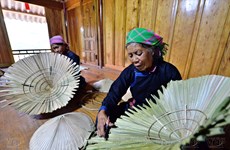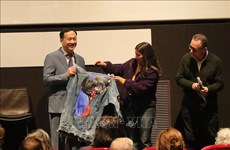Vietnam folk music added to world heritage list
The art of Don Ca Tai Tu’s music and songs in southern Vietnam has
officially become part of the UNESCO Intangible Cultural Heritage of
Humanity.
The art of Don Ca Tai Tu’s music and songs in southern Vietnam has
officially become part of the UNESCO Intangible Cultural Heritage of
Humanity.
The United Nations Educational, Scientific and Cultural Organisation (UNESCO) announced the decision on December 5 during the eighth session of its Intergovernmental Committee for the Safeguarding of the Intangible Cultural Heritage that is taking place in Baku, Azerbaijan, from December 2-7.
Known as a musical art that has both scholarly and folk roots, Don Ca Tai Tu (amateur singing) developed in southern Vietnam in the late 19th century.
People in the south consider it an indispensable spiritual cultural activity and a highly valued part of their cultural heritage, which is performed at numerous events, such as festivals, death anniversary rituals, and celebratory social events. The audience can join in by practising, making comments or creating new lyrics for songs.
This genre of Vietnamese folk music was among 14 entries added to the UNESCO’s list, including traditional Japanese Washoku cooking methods, kimjang-the making and sharing of traditional kimchi dish of the Republic of Korea, Belgian horseback shrimp fishing, Jamdani weaving in Bangladesh and the Cirio de Nazare religious festival in Brazil, among others.
Established in 2008, the Intangible Cultural Heritage list comprises some 100 traditional events from around the globe and is designed to help demonstrate the diversity of this heritage and raise awareness about its importance.
To date, Vietnam has had 17 world-recognised heritage items. The first recognition was given the Hue imperial relic complex in 1992. Ha Long Bay was twice listed as world heritage in 1994 and 2000. Hoi An ancient town and My Son sanctuary received the honor in 1999, followed by the Hue Royal Court music in 2003 and the Central Highlands gongs in 2005. Over the last five years, Hanoi’s Royal citadel and the Ho Dynasty’s citadel won the world recognition.
Intangible cultural heritage namely Tru singing, Quan Ho folk singing, Giong festival, Xoan singing and the Worshipping rituals of the Hung Kings were also listed as world heritage. The Nguyen dynasty’s woodblocks, Vinh Nghiem pagoda’s woodblocks and 82 steles of doctorate degree holders from 1442 to 1779 have been included.-VNA
The United Nations Educational, Scientific and Cultural Organisation (UNESCO) announced the decision on December 5 during the eighth session of its Intergovernmental Committee for the Safeguarding of the Intangible Cultural Heritage that is taking place in Baku, Azerbaijan, from December 2-7.
Known as a musical art that has both scholarly and folk roots, Don Ca Tai Tu (amateur singing) developed in southern Vietnam in the late 19th century.
People in the south consider it an indispensable spiritual cultural activity and a highly valued part of their cultural heritage, which is performed at numerous events, such as festivals, death anniversary rituals, and celebratory social events. The audience can join in by practising, making comments or creating new lyrics for songs.
This genre of Vietnamese folk music was among 14 entries added to the UNESCO’s list, including traditional Japanese Washoku cooking methods, kimjang-the making and sharing of traditional kimchi dish of the Republic of Korea, Belgian horseback shrimp fishing, Jamdani weaving in Bangladesh and the Cirio de Nazare religious festival in Brazil, among others.
Established in 2008, the Intangible Cultural Heritage list comprises some 100 traditional events from around the globe and is designed to help demonstrate the diversity of this heritage and raise awareness about its importance.
To date, Vietnam has had 17 world-recognised heritage items. The first recognition was given the Hue imperial relic complex in 1992. Ha Long Bay was twice listed as world heritage in 1994 and 2000. Hoi An ancient town and My Son sanctuary received the honor in 1999, followed by the Hue Royal Court music in 2003 and the Central Highlands gongs in 2005. Over the last five years, Hanoi’s Royal citadel and the Ho Dynasty’s citadel won the world recognition.
Intangible cultural heritage namely Tru singing, Quan Ho folk singing, Giong festival, Xoan singing and the Worshipping rituals of the Hung Kings were also listed as world heritage. The Nguyen dynasty’s woodblocks, Vinh Nghiem pagoda’s woodblocks and 82 steles of doctorate degree holders from 1442 to 1779 have been included.-VNA













